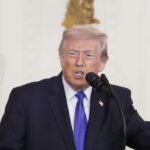Much like the United States under the Democrat-dominated establishment and corrupt bureaucracy, Europe’s “democracies” qualify as democracies in name only.
In other words, it takes more than elections to define a democratic regime. This is the first thing one must get clear when discussing the future of Ukraine and the North Atlantic Treaty Organization in the age of President Donald Trump.
According to The Washington Times, French President Emmanuel Macron, during a joint news conference with Trump at the White House on Monday, offered a generic but potentially meaningful acknowledgement of the need for European countries, including his own, to increase their financial commitments to the security of Europe, in particular war-torn Ukraine.
“As Europeans we have committed to being stakeholders in these security guarantees and we are also well aware that Europeans need to do more for security in Europe, for defense in Europe and to more fairly share the security burden that your country has been carrying for so many years,” Macron said.
Monday marked the three-year anniversary of Russia’s invasion of Ukraine.
Informed observers, of course, have long known that the conflict has much deeper roots in the recent past. Moreover, contrary to the deranged assertions of former President Joe Biden and others, it has nothing to do with democracy.
Meanwhile, Trump has spent many years harping on the need for non-U.S. NATO countries to pay their fair share.
Now, the president appears open to every manner of conversation not only about Ukraine, but also about the future of NATO.
First, Trump has taken steps to negotiate an end to the Russia-Ukraine War. That, of course, would render moot any discussion of future financial commitments to Ukraine’s war effort. But it would also raise the question of security guarantees and potential NATO peacekeepers.
Will Trump ultimately be able to bring peace to Ukraine and Russia?
Yes: 100% (2 Votes)
No: 0% (0 Votes)
At the same time, the president has insisted upon economic agreements that would compensate Americans for aid already provided.
Last week, Ukrainian President Volodymyr Zelenskyy complicated matters when he described Trump as living in a “disinformation space.” The president replied by blasting Zelenskyy as a “dictator.”
In other words, Trump has recognized the urgent need to end the Russia-Ukraine War. And, unlike disgraceful establishment politicians, he has done so without kowtowing to the Ukrainian president.
Lurking behind the immediate Ukraine problem, however, a more fundamental question looms. Namely, to what extent should the United States continue to involve itself, let alone act as lead partner, in NATO?
For those who listened closely, this was the question at the core of Vice President J.D. Vance’s brilliant speech at the Munich Security Conference in Germany earlier this month.
Vance did more than call out violations of free speech and freedom of conscience across Europe. He stated publicly what spineless American politicians and diplomats hitherto have refused to say: Europe, including host Germany, has drifted toward an authoritarianism that makes a mockery of their pretensions to membership in an alliance of democratic nations.
Above all, Vance implied the obvious: America does not need Europe. It never has.
In the last century, hundreds of thousands of Americans died fighting in Europe. And nearly 80 years ago the United States pledged to defend Western Europe from Soviet Communism. To that end, NATO was born in 1949.
The Soviet Union, however, collapsed in 1991. Yet NATO remained. An informed American citizen, therefore, may rightly wonder why the United States must continue funding Europe’s defense.
“This peace must allow for Ukrainian sovereignty and allow Ukraine to negotiate with other stakeholders regarding issues it affects,” Macron said at Monday’s news conference with Trump.
Of course, no reasonable person objects to Ukrainian sovereignty. But the problem is more fundamental than that.
In short, Macron must surely know that America under Trump has begun reevaluating its posture toward Europe in general. And that makes the French president’s confident-sounding proclamations about Ukraine ring rather hollow.
Still, if Macron’s concession leads to meaningful action in Europe, if those governments roll back their anti-democratic assaults on free speech, and if Trump deems it consistent with American interests, then perhaps a U.S.-led NATO can survive.
Advertise with The Western Journal and reach millions of highly engaged readers, while supporting our work. Advertise Today.






